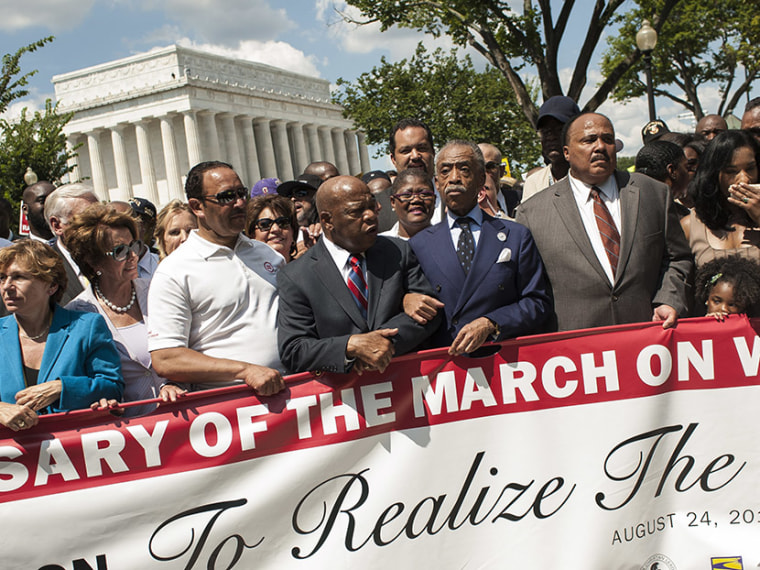Lawmakers, activists, and civil rights leaders fired up a crowd of thousands on Washington, D.C.’s national mall Saturday to commemorate the 50th anniversary of the landmark March on Washington.
Speakers, including Attorney General Eric Holder and Congressman John Lewis, called for increasing the minimum wage, combating a national rollback in voting, and equal rights for people of all races and sexual orientation.
“This morning as we recommit ourselves to [Dr. Martin Luther King Jr.’s] quest for progress, we also stand on the shoulders of untold millions whose names may be lost to history, but whose stories and whose contributions must be remembered and must be treasured,” Holder said Saturday.
“But for them, I would not be Attorney General of the United States and Barack Obama would not President of the United States of America,” he said.
Former chairman of the NAACP, Myrlie Evers-Williams, expressed regret that she hadn’t been able to attend the 1963 march. Her husband, Medgar Evers, was assassinated weeks before the march.
Evers-Williams invoked the “Stand Your Ground” law that came into focus after the shooting death of Florida teen Trayvon Martin, and has become a hot-button issue, especially within the African-American community.
“I’m asking today to flip that coin and make ‘Stand your Ground’ a positive thing for all of us who believe in freedom and justice and equality,” she said. “That we stand firm on the ground that we have already, and be sure that nothing is taken away from us because there are efforts to turn back the clock of freedom. And I ask you today, will you allow that to happen?”
“Take the words ‘stand your ground’ in a positive sense,” Evers-Williams urged the crowd. “Stand your ground in terms of fighting for justice and equality….Take a negative and make a positive out of it. Ask where we are today, assess where we are coming from, assess where we can go. Standing our ground for justice, for freedom, for equality.”
Evers also paid tribute to the women who fought for equality saying we must not forget Coretta Scott King and Betty Shabazz, among others.
Visit NBCNews.com for breaking news, world news, and news about the economy
Civil right leader and Georgia congressman John Lewis, the only surviving speaker from the 1963 march, fought tirelessly for voting rights. He suffered a skull fracture on Bloody Sunday, the 1965 march from Selma to Montgomery, Alabama, that turned violent when state troopers attacked the silent protestors with tear gas and clubs.
“I gave a little blood on that bridge in Selma, Alabama for the right to vote,” Lewis told the crowd Saturday. “And I’m not going to let the Supreme Court take the right to vote away from us.” The Supreme Court ruled in June to strip a key enforcement mechanism from the 1965 Voting Rights Act, which was enacted to protect minority voters from discrimination.
“You cannot stand by, you have to stand up, speak up, speak out, and get in the way. Make some noise! The vote is precious; it is almost sacred, the most powerful nonviolent tool we have in a democratic society and we’ve got to use it,” he said.
The Reverend Al Sharpton, founder and president of the National Action Network and host of MSNBC’s PoliticsNation, delivered the keynote speech Saturday.
He retold the story of a successful young African-American man who told him that he didn’t understand “all this civil rights marching” and told him, “Civil rights didn’t write my resume.”
“I looked at his resume and said ‘You’re right, civil rights didn’t write your resume. But civil rights made somebody read your resume,” Sharpton said to applause.
Sharpton also said that the movement had some housekeeping to do in how women are treated and young people develop.
“We owe a debt to those who thought enough for you to put their lives on the line,” Sharpton. “We owe a debt to those that believed in us when we did not believe in ourselves. And we need to conduct ourselves in a way that respects that. Don’t you ever think that men like Medgar Evers died to give you the right to be a hoodlum, or to give you the right to be a thug. That is not what they gave their life about.”
“We need to talk about how we address one another, how we respect one another. We need to teach our young folk, I don’t care how much money they give you, don’t disrespect your women. No matter what they promise you, make it clear that you know that Rosa Parks wasn’t no ho and Fanny Lou Hamer wasn’t no bitch,” he said.
Sharpton brought the family of Emmett Till, who was brutally murdered at age 14 for reportedly flirting with a white woman in Mississippi, together with the family of Trayvon Martin for a prayer by Rev. Martin Luther King Jr.’s daughter, Rev. Bernice King.
After the benediction, the marchers made their way to The King Center. President Barack Obama will deliver a speech from the steps of the Lincoln Memorial Wednesday.
